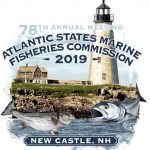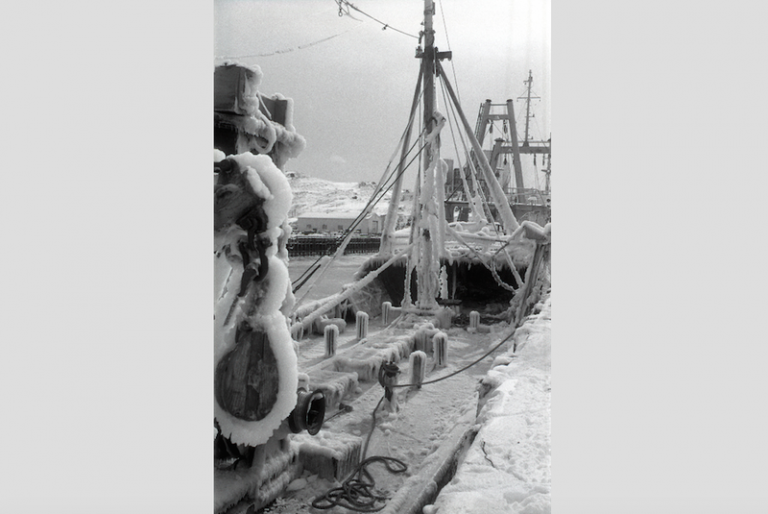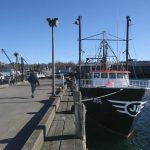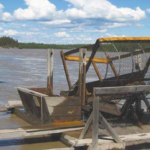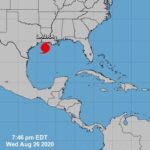Tag Archives: obama-administration
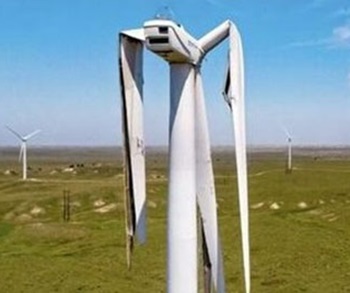
Federal bailout coming for failing offshore wind companies?
Team Biden is preparing a bailout package for the offshore wind industry that it already heavily subsidizes, a report said. The Biden Administration’s plan is to have offshore wind provide enough power to meet the annual demand of 10 million American homes by 2030, according to the White House. Writing in his “Energy Absurdity” Substack, David Blackmon, an energy analyst with over 40 years of experience in the oil and gas industry, said that lobbying is likely to soon begin for Team Biden to dip into taxpayer coffers to pony up more billions in funding for failing wind farms. “Everyone should prepare themselves to see an effort in Washington, D.C. to allocate billions more dollars to bail out Big Offshore Wind developers soon,” Blackmon wrote. >>click to read<< 10:55
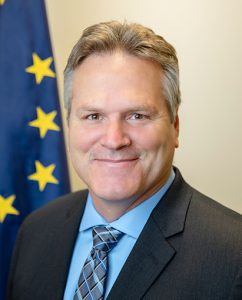
Alaska leaders petition the US Supreme Court for reversal of EPA ban on Pebble Mine
The Dunleavy administration on Wednesday asked the U.S. Supreme Court to overturn the Environmental Protection Agency’s decision to block the controversial Pebble copper and gold mine. Gov. Mike Dunleavy, in the statement, echoed arguments made in the brief assert the EPA action effectively confiscates state property and clashes with the Alaska constitution’s mandates. “Our constitution is clear: Alaska is responsible for utilizing, developing, and conserving all of the State’s natural resources for the maximum benefit of its people,” Dunleavy said in the statement. “Bureaucrats in Washington D.C. are exercising unbridled and unlawful power to choke off any further discussion on this important decision affecting so many Alaskans.” >click to read< 18:09
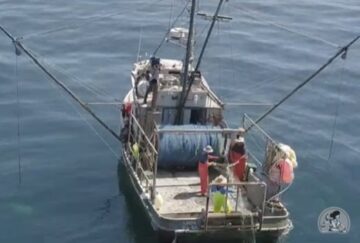
Judge advances lawsuit over California drift gillnet ban
A federal judge has advanced a lawsuit against a California state law that bans the use of swordfish catching gillnets,,, Two fishermen sued the state two years ago, arguing that because they obtained federal permits to use gillnets, California cannot pass a law that deprives them of those federal rights. The fishermen, Joseph Abad and Austen Brown, asked for a preliminary injunction to block enforcement of the state law, but a federal judge denied that request. >click to read< 10:17
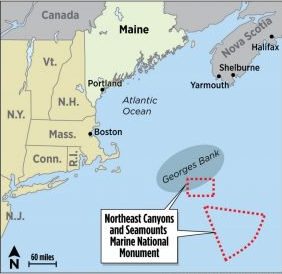
A legal war, a Biden win: What’s next for Northeast Canyons and Seamounts Marine National Marine Monument?
Lobstering groups say they aren’t opposed to protecting the natural habitats that sustain their industry. But they question whether the 5,000-square-mile monument is consistent with the Antiquities Act’s provision that designations be limited to the “smallest area compatible” with protecting the rich supply of marine life and corals that populate the Atlantic site. They also questioned the Obama administration’s position, which Trump officials have defended in court,,, Blocking off industry’s access to thousands of square miles of the Atlantic Ocean should require a little more public input, the fishing groups argue. Trump instead chose to preserve the site, although he traveled this summer to Maine to announce that he would lift all fishing restrictions in the monument.,, And in a matter of weeks, President-elect Joe Biden, who was vice president when Obama created the Atlantic monument, will be sitting in the White House. >click to read< 08:05

Would Biden bring offshore wind to the West Coast?
Offshore wind supporters say Democratic presidential nominee Joe Biden could be a deciding factor in a long-standing battle if he’s elected: bringing the first turbines to the West Coast. The idea of mooring turbines onto floating platforms in California’s deep waters has been in the works since the Obama administration, when Interior Department officials responded to unsolicited proposals from wind companies by mapping three potential areas for turbine construction and asking for comment on their viability. If completed, the plan could have major implications for the state’s emission profile and the offshore wind industry, which to date has largely been focused along the U.S. East Coast. >click to read< 09:36
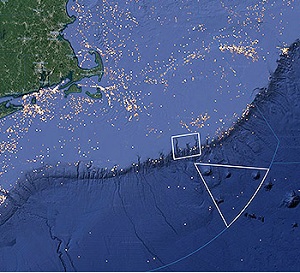
Northeast Canyons and Seamounts Marine National Monument showdown reaches high court
The Obama administration exceeded its authority in 2016 when it designated the Northeast Canyons and Seamounts Marine National Monument and cut off access to key fisheries, attorneys for the Massachusetts Lobstermen’s Association and other groups argued in their petition filed with the Supreme Court yesterday. A recent move by the Trump administration to preserve the monument but dissolve fishing restrictions has not erased the need for the high court to consider the case, the groups wrote. Those rollbacks are now subject to a separate lawsuit launched by environmental groups. >click to read< 12:28
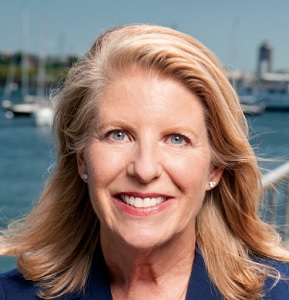
Why New England Aquarium is fighting back against the Trump administration
Decades of work at the New England Aquarium went into securing special protected status for an area of underwater canyons and mountains off Cape Cod.,, During a visit to Maine last Friday, President Donald Trump announced he was signing a proclamation to allow commercial fishing in the nearly 5,000-square-mile ecosystem, which was declared a national marine monument by former President Barack Obama in 2016.,, Vikki Spruill, the CEO and president of the New England Aquarium, called the Republican president’s proclamation“irresponsible and shortsighted.” “The Trump Administration has chosen a moment of national vulnerability to take aim at the environment,” Spruill said in a statement Monday, referring to the COVID-19 pandemic and the national protests against police brutality. >click to read< 13:00
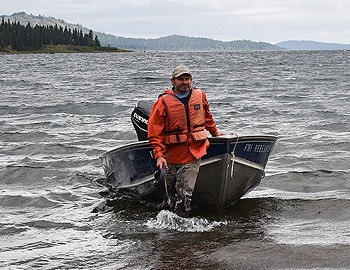
Meet the salmon scientist at the center of the Pebble fight
Beneath the steady static of rain on a tin roof, University of Washington aquatic ecologist Daniel Schindler made some soup. On a clear day, he’d be wading through thousands of hump-backed, hooked-jawed sockeye that turn the pristine waters of southwestern Alaska red every year. Schindler has put himself in the middle of the two-decade fight over the Pebble mine, a proposal to build one of the world’s largest gold and copper mines roughly 100 miles east of Lake Nerka. >click to read< 20:01
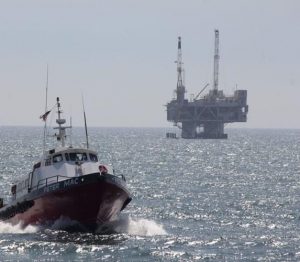
Opinion: Atlantic drilling issue dries up again, without lasting resolution
The curtain has come down on the latest of “to drill or not to drill in the Atlantic.” It ran two years, just a bit longer than the one before it in a series dating to the 1980s. The ending, as expected, was the same, since deepwater drilling in the Atlantic wouldn’t be profitable and is broadly opposed. A renewed federal effort begun in May 2017 to offer leases to drill for oil and natural gas off the East Coast was suspended indefinitely by the Trump administration. A similar push by the Obama administration ended with reinstatement of a temporary moratorium on drilling. Other than the presidents, most of the players remained the same. Opposition was led by state and local officials in both parties the length of the coast,,, >click to read<18:36

California’s crab fleet awaits share of $200 million in disaster relief
The North Coast fishing fleet has welcomed some rare good news out of Washington, D.C., where the congressional budget deal reached last week included disaster relief funds intended to offset losses from the ill-fated commercial Dungeness crab season of three years ago. But just how much help may be on the way is uncertain and could remain so for some time. There’s bureaucracy involved, and the wheels of government often turn slowly for fishermen seeking aid. >click to read< 17:57
Former Obama Official: Bureaucrats Manipulate Climate Stats To Influence Policy
 A former member of the Obama administration claims Washington D.C. often uses “misleading” news releases about climate data to influence public opinion. Former Energy Department Undersecretary Steven Koonin told The Wall Street Journal Monday that bureaucrats within former President Barack Obama’s administration spun scientific data to manipulate public opinion. “What you saw coming out of the press releases about climate data, climate analysis, was, I’d say, misleading, sometimes just wrong,” Koonin said, referring to elements within the Obama administration he said were responsible for manipulating climate data.,, Press officers work with scientists within agencies like the National Oceanic Administration (NOAA) and NASA and are responsible for crafting misleading press releases on climate, he added. Koonin is not the only one claiming wrongdoing. House lawmakers with the Committee on Science, Space and Technology, for instance, recently jumpstarted an investigation into NOAA after a whistleblower said agency scientists rushed a landmark global warming study to influence policymakers. Click here to read the rest, and click here to watch the video 16:06
A former member of the Obama administration claims Washington D.C. often uses “misleading” news releases about climate data to influence public opinion. Former Energy Department Undersecretary Steven Koonin told The Wall Street Journal Monday that bureaucrats within former President Barack Obama’s administration spun scientific data to manipulate public opinion. “What you saw coming out of the press releases about climate data, climate analysis, was, I’d say, misleading, sometimes just wrong,” Koonin said, referring to elements within the Obama administration he said were responsible for manipulating climate data.,, Press officers work with scientists within agencies like the National Oceanic Administration (NOAA) and NASA and are responsible for crafting misleading press releases on climate, he added. Koonin is not the only one claiming wrongdoing. House lawmakers with the Committee on Science, Space and Technology, for instance, recently jumpstarted an investigation into NOAA after a whistleblower said agency scientists rushed a landmark global warming study to influence policymakers. Click here to read the rest, and click here to watch the video 16:06
NOAA Says Its Hot As Ever? A NOAA Whistle Blower Turns The Heat Up On Them!!
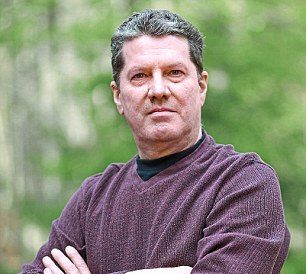 A high-level whistleblower has told this newspaper that America’s National Oceanic and Atmospheric Administration (NOAA) breached its own rules on scientific integrity when it published the sensational but flawed report, aimed at making the maximum possible impact on world leaders including Barack Obama and David Cameron at the UN climate conference in Paris in 2015. The report claimed that the ‘pause’ or ‘slowdown’ in global warming in the period since 1998 – revealed by UN scientists in 2013 – never existed, and that world temperatures had been rising faster than scientists expected. But the whistleblower, Dr John Bates, a top NOAA scientist with an impeccable reputation, has shown The Mail on Sunday irrefutable evidence that the paper was based on misleading, ‘unverified’ data. It was never subjected to NOAA’s rigorous internal evaluation process – which Dr Bates devised. The report claimed that the ‘pause’ or ‘slowdown’ in global warming in the period since 1998 – revealed by UN scientists in 2013 – never existed, and that world temperatures had been rising faster than scientists expected. Launched by NOAA with a public relations fanfare, it was splashed across the world’s media, and cited repeatedly by politicians and policy makers. Read the full story here 20:55
A high-level whistleblower has told this newspaper that America’s National Oceanic and Atmospheric Administration (NOAA) breached its own rules on scientific integrity when it published the sensational but flawed report, aimed at making the maximum possible impact on world leaders including Barack Obama and David Cameron at the UN climate conference in Paris in 2015. The report claimed that the ‘pause’ or ‘slowdown’ in global warming in the period since 1998 – revealed by UN scientists in 2013 – never existed, and that world temperatures had been rising faster than scientists expected. But the whistleblower, Dr John Bates, a top NOAA scientist with an impeccable reputation, has shown The Mail on Sunday irrefutable evidence that the paper was based on misleading, ‘unverified’ data. It was never subjected to NOAA’s rigorous internal evaluation process – which Dr Bates devised. The report claimed that the ‘pause’ or ‘slowdown’ in global warming in the period since 1998 – revealed by UN scientists in 2013 – never existed, and that world temperatures had been rising faster than scientists expected. Launched by NOAA with a public relations fanfare, it was splashed across the world’s media, and cited repeatedly by politicians and policy makers. Read the full story here 20:55
Canadian seafood industry braces for new U.S. traceability rules
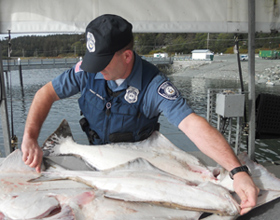 Canadian seafood producers will need to “raise their game” to satisfy new American seafood traceability rules, according to federal Fisheries Minister Dominic LeBlanc. The Seafood Import Monitoring Program was one of the final acts of the Obama administration. It will require much more detailed information about catches before they are allowed into the United States. “We need to raise our game to ensure that the Americans receive the evidence they require that our fisheries are compliant, as they are,” LeBlanc said. The goal is stop illegal, unregulated and unreported catches from entering the U.S. The measures go into effect next January. Read the story here 08:18
Canadian seafood producers will need to “raise their game” to satisfy new American seafood traceability rules, according to federal Fisheries Minister Dominic LeBlanc. The Seafood Import Monitoring Program was one of the final acts of the Obama administration. It will require much more detailed information about catches before they are allowed into the United States. “We need to raise our game to ensure that the Americans receive the evidence they require that our fisheries are compliant, as they are,” LeBlanc said. The goal is stop illegal, unregulated and unreported catches from entering the U.S. The measures go into effect next January. Read the story here 08:18
NFI sues NOAA over new IUU rule
The National Fisheries Institute 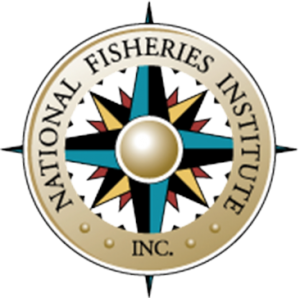 (NFI) has sued the National Oceanic and Atmospheric Administration (NOAA) and the Department of Commerce over a recently enacted rule that could cost the commercial fishing industry as much as USD 1 billion (EUR 946 million) annually. NOAA’s National Marine Fisheries Service issued a final rule on 9 December that requires U.S. seafood importers to trace the origin of the fish they import to either the specific boat that caught the fish or to its collection point, as well as the location and date the fish was caught. The regulation was designed to combat illegal, unregulated and unreported (IUU) fishing regulation, but it will cost the industry at least USD 100 million (EUR 95 million) per year, NFI said in a press release. Read the story here 14:11
(NFI) has sued the National Oceanic and Atmospheric Administration (NOAA) and the Department of Commerce over a recently enacted rule that could cost the commercial fishing industry as much as USD 1 billion (EUR 946 million) annually. NOAA’s National Marine Fisheries Service issued a final rule on 9 December that requires U.S. seafood importers to trace the origin of the fish they import to either the specific boat that caught the fish or to its collection point, as well as the location and date the fish was caught. The regulation was designed to combat illegal, unregulated and unreported (IUU) fishing regulation, but it will cost the industry at least USD 100 million (EUR 95 million) per year, NFI said in a press release. Read the story here 14:11
Obama Administration Issuing New Rules to Curb Illegal Fishing, Seafood Fraud
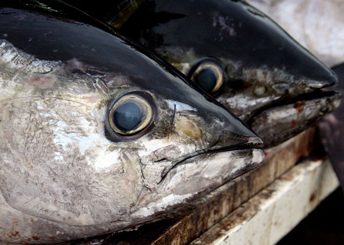 The Obama administration is issuing new rules it says will crack down on illegal fishing and seafood fraud by preventing unverifiable fish products from entering the U.S. market. The new protections are called the Seafood Import Monitoring Program, and they are designed to stop illegally fished and intentionally misidentified seafood from getting into stores and restaurants by way of imported fish. The rules will require seafood importers to report information and maintain records about the harvest and chain of custody of fish, officials with the National Oceanic and Atmospheric Administration said. The program will start by focusing on “priority species” that are especially vulnerable to illegal fishing, such as popular food fish like tuna, swordfish, Atlantic cod and grouper. The government hopes eventually to broaden the program to include all fish species, NOAA officials said. Read the rest here 17:50
The Obama administration is issuing new rules it says will crack down on illegal fishing and seafood fraud by preventing unverifiable fish products from entering the U.S. market. The new protections are called the Seafood Import Monitoring Program, and they are designed to stop illegally fished and intentionally misidentified seafood from getting into stores and restaurants by way of imported fish. The rules will require seafood importers to report information and maintain records about the harvest and chain of custody of fish, officials with the National Oceanic and Atmospheric Administration said. The program will start by focusing on “priority species” that are especially vulnerable to illegal fishing, such as popular food fish like tuna, swordfish, Atlantic cod and grouper. The government hopes eventually to broaden the program to include all fish species, NOAA officials said. Read the rest here 17:50
Enviros, Fishing interests balk at Obama’s exclusion of S.C. coastlines from drilling ban
 “We are extremely disappointed,” Frank Knapp, president and CEO of the South Carolina Small Business Chamber of Commerce and co-founder of the Business Alliance for Protecting the Atlantic Coast, told The Post and Courier. Last week, Knapp’s organization, representing 35,000 businesses and 500,000 commercial fishing families, delivered a letter to the Obama administration asking for a ban on drilling and seismic testing. “Oil and gas exploration and development activities threaten the vibrant coastal environment that supports nearly 1.4 million jobs and contributes $95 billion to the annual gross domestic product, mainly through tourism, commercial fishing and recreation,” Knapp and fellow BAPAC members wrote. “Our currently thriving East Coast businesses are reliant upon healthy ocean ecosystems and are inextricably tied to clean, coastal waters.” The pleas appeared to have fallen on deaf ears. Read the rest here 11:42
“We are extremely disappointed,” Frank Knapp, president and CEO of the South Carolina Small Business Chamber of Commerce and co-founder of the Business Alliance for Protecting the Atlantic Coast, told The Post and Courier. Last week, Knapp’s organization, representing 35,000 businesses and 500,000 commercial fishing families, delivered a letter to the Obama administration asking for a ban on drilling and seismic testing. “Oil and gas exploration and development activities threaten the vibrant coastal environment that supports nearly 1.4 million jobs and contributes $95 billion to the annual gross domestic product, mainly through tourism, commercial fishing and recreation,” Knapp and fellow BAPAC members wrote. “Our currently thriving East Coast businesses are reliant upon healthy ocean ecosystems and are inextricably tied to clean, coastal waters.” The pleas appeared to have fallen on deaf ears. Read the rest here 11:42
I.U.U. Fishing/The latest supposed ocean crisis/All the news that’s fit to print?
 Nils Stolpe/FishNet USA – Over the past several years there has been much discussion, debate, posturing, misrepresentation, exaggeration and incipient empire building on and around the subject of illegal, unreported and unregulated (IUU) fishing. Most of this has been driven by ENGOs and the mega-foundations that support them because they have all of these fish saviors on the payroll with, since the demise of overfishing, not an awful lot to do. Not surprisingly the Obama administration has been complicit in this. Starting out with a point of clarification, IUU fishing is, or should be, a concern in some areas of the world’s oceans – but for reasons that I’ll get to an a bit, it isn’t, or shouldn’t be, in the U.S. Exclusive Economic Zone (EEZ). In spite of this you can bet dollars to donuts that that’s where all of the ENGOs will be focusing their IUU efforts, because it’s a lot more comfortable, convenient and safe to assault domestic fishermen from their cushy digs in Philadelphia or Washington DC than from some tropical or sub-tropical Hell hole where most of the IUU activity is based. And, I’m sure the feeling in those cushy digs in Philadelphia and Washington is that the public and the pols aren’t sophisticated enough to realize this, and in all likelihood – thanks to the mega-million dollar PR juggernaut that is backstopping their efforts – never will be. To read the complete article, click here 15:15
Nils Stolpe/FishNet USA – Over the past several years there has been much discussion, debate, posturing, misrepresentation, exaggeration and incipient empire building on and around the subject of illegal, unreported and unregulated (IUU) fishing. Most of this has been driven by ENGOs and the mega-foundations that support them because they have all of these fish saviors on the payroll with, since the demise of overfishing, not an awful lot to do. Not surprisingly the Obama administration has been complicit in this. Starting out with a point of clarification, IUU fishing is, or should be, a concern in some areas of the world’s oceans – but for reasons that I’ll get to an a bit, it isn’t, or shouldn’t be, in the U.S. Exclusive Economic Zone (EEZ). In spite of this you can bet dollars to donuts that that’s where all of the ENGOs will be focusing their IUU efforts, because it’s a lot more comfortable, convenient and safe to assault domestic fishermen from their cushy digs in Philadelphia or Washington DC than from some tropical or sub-tropical Hell hole where most of the IUU activity is based. And, I’m sure the feeling in those cushy digs in Philadelphia and Washington is that the public and the pols aren’t sophisticated enough to realize this, and in all likelihood – thanks to the mega-million dollar PR juggernaut that is backstopping their efforts – never will be. To read the complete article, click here 15:15
Obama Administration Approves Nation’s First Ocean Management Plans
 President Obama’s National Ocean Council has approved the nation’s first ocean plans for the Northeast and Mid-Atlantic regions. The plans feature databases about the regions’ marine life and habitats. They’ll inform how to plan commercial and recreational activities at sea, while protecting those resources. Grover Fugate, executive director of the Rhode Island Coastal Resources Management Council, said the databases are open to the public. “So people can see the information that’s going into federal decisions and also state decisions,” said Fugate, “but also then to create a more coordinated decision-making process.” “We’re looking to the ocean for clean renewable wind energy as well as tidal and wave energy,” continued Brooks. “The ocean is increasingly supporting aquaculture and gas pipelines and cables. So ocean planning is an effort to get out ahead of the increasing use of our ocean and be proactive about managing it comprehensively based on science and with the best data possible.” Read the rest here 18:14
President Obama’s National Ocean Council has approved the nation’s first ocean plans for the Northeast and Mid-Atlantic regions. The plans feature databases about the regions’ marine life and habitats. They’ll inform how to plan commercial and recreational activities at sea, while protecting those resources. Grover Fugate, executive director of the Rhode Island Coastal Resources Management Council, said the databases are open to the public. “So people can see the information that’s going into federal decisions and also state decisions,” said Fugate, “but also then to create a more coordinated decision-making process.” “We’re looking to the ocean for clean renewable wind energy as well as tidal and wave energy,” continued Brooks. “The ocean is increasingly supporting aquaculture and gas pipelines and cables. So ocean planning is an effort to get out ahead of the increasing use of our ocean and be proactive about managing it comprehensively based on science and with the best data possible.” Read the rest here 18:14
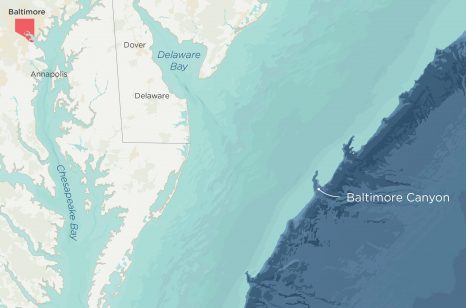
Nations 1st Urban Sanctuary Designation Sought For Popular Offshore Fishing area, Baltimore Canyon
The National Aquarium on Monday announced it is seeking the public’s support in its effort to nominate the Baltimore Canyon off the coast of Ocean City as the nation’s first Urban National Marine Sanctuary. The Baltimore Canyon, a 28-mile long and five-mile wide submarine canyon off the coast of Ocean City lies at the center of the resort’s multi-million dollar fishing industry and contains fragile deep sea corals rarely seen anywhere in the world along with habitat for countless species of marine life. The National Aquarium has launched a petition drive to have it designated as the nation’s first Urban National Marine Sanctuary, presenting a unique opportunity to connect an urban population to the ecological treasure using cutting edge deep sea exploration technology. While an Urban National Marine Sanctuary designation for the Baltimore Canyon does not appear to impact fishing and other recreational uses, it certainly bears monitoring. Earlier this fall, the Obama administration designated a vast area the size of Connecticut off the coast of Cape Cod as the Northeast Canyons and Seamounts Marine National Monument, the first of its kind in the Atlantic. Marine National Monuments are far more restrictive than national marine sanctuaries. The long-range plan is to phase out all commercial fishing in the marine national monument off the coast of Cape Cod although recreational fishing will still be allowed. Read the story here 08:48
Opinion: Stop the Obama administration from destroying our coastal economy
 The Obama Administration is very close to unleashing an underwater sonic boom attack off our Atlantic Coast, including South Carolina’s. You probably have two immediate questions. What am I talking about? And why should you care? First, a sonic boom is how Richard Viso, a professor in the Coastal Environment School at Coastal Carolina University, describes seismic testing. Seismic testing is a highly dangerous process that uses intense airgun blasting to send extremely loud sound waves miles below the seafloor in a hunt for oil deposits. One seismic testing vessel can tow up to 96 airguns, which can cover an area 21 times larger than the National Mall in Washington. These sonic booms, which can be heard for thousands of miles underwater, are repeated every 10 to 12 seconds, creating one of the loudest noises in the oceans. Seismic testing under just one lease can go on for up to an entire year. The Obama Administration’s Department of Interior is set to issue up to 9 seismic testing permits because oil companies don’t share information. Read the story here 11:37
The Obama Administration is very close to unleashing an underwater sonic boom attack off our Atlantic Coast, including South Carolina’s. You probably have two immediate questions. What am I talking about? And why should you care? First, a sonic boom is how Richard Viso, a professor in the Coastal Environment School at Coastal Carolina University, describes seismic testing. Seismic testing is a highly dangerous process that uses intense airgun blasting to send extremely loud sound waves miles below the seafloor in a hunt for oil deposits. One seismic testing vessel can tow up to 96 airguns, which can cover an area 21 times larger than the National Mall in Washington. These sonic booms, which can be heard for thousands of miles underwater, are repeated every 10 to 12 seconds, creating one of the loudest noises in the oceans. Seismic testing under just one lease can go on for up to an entire year. The Obama Administration’s Department of Interior is set to issue up to 9 seismic testing permits because oil companies don’t share information. Read the story here 11:37
NRDC Enviro: Obama Administration is on the verge of weakening the nations fisheries regulations!
 The U.S. has been a global leader in confronting and effectively tackling the overexploitation of its ocean fisheries. While there’s work still be done—more than three dozen fish populations or stocks (out of 233) remain overfished—American fisheries today are among the most sustainable in the world. Yet, with the job unfinished, the Obama Administration is on the verge of weakening fisheries regulations. Last month, enviro 44 organizations wrote to the president opposing these rollbacks. The changes would represent the first significant weakening of the country’s ocean fisheries policy since 1996, when important conservation provisions were enacted into law. NOAA Fisheries, the agency that regulates U.S. fisheries, is proposing to revise the regulations that implement the Magnuson-Stevens Fishery Conservation and Management Act—the nation’s ocean fisheries law—saying that this will give managers more flexibility to handle current fishery management challenges. Read the rest here 19:39 Read this, National Marine Fisheries Service Proposes Weakening Magnuson-Stevens Act Regulations click here
The U.S. has been a global leader in confronting and effectively tackling the overexploitation of its ocean fisheries. While there’s work still be done—more than three dozen fish populations or stocks (out of 233) remain overfished—American fisheries today are among the most sustainable in the world. Yet, with the job unfinished, the Obama Administration is on the verge of weakening fisheries regulations. Last month, enviro 44 organizations wrote to the president opposing these rollbacks. The changes would represent the first significant weakening of the country’s ocean fisheries policy since 1996, when important conservation provisions were enacted into law. NOAA Fisheries, the agency that regulates U.S. fisheries, is proposing to revise the regulations that implement the Magnuson-Stevens Fishery Conservation and Management Act—the nation’s ocean fisheries law—saying that this will give managers more flexibility to handle current fishery management challenges. Read the rest here 19:39 Read this, National Marine Fisheries Service Proposes Weakening Magnuson-Stevens Act Regulations click here
Work on Atlantic Marine Monument not done yet, Eric Reid, North Kingstown, Rhode Island
 In June, House Natural Resources Committee Chairman Rob Bishop, a Republican U.S. Rep. Utah, visited New Bedford and spoke to several members of the industry regarding their concerns about a potential marine monument off the coast of New England. Following the meeting, I remarked to The Standard-Times reporter that a monument could potentially cost the industry up to $500 million in economy activity, in addition to countless jobs. This estimate has been criticized for being far too high. But it is based on two premises — a conservative estimate of the economic impact of fishing in New England, and the lack of clarity surrounding the marine monument discussion. Currently, the commercial fishing industry from Maine to New Jersey brings in an estimated $1.4 billion per year in landings. These landings support hundreds of millions of dollars more in economic activity for related and shoreside businesses, and employ tens of thousands of people up and down the coast. Read the rest here 08:18
In June, House Natural Resources Committee Chairman Rob Bishop, a Republican U.S. Rep. Utah, visited New Bedford and spoke to several members of the industry regarding their concerns about a potential marine monument off the coast of New England. Following the meeting, I remarked to The Standard-Times reporter that a monument could potentially cost the industry up to $500 million in economy activity, in addition to countless jobs. This estimate has been criticized for being far too high. But it is based on two premises — a conservative estimate of the economic impact of fishing in New England, and the lack of clarity surrounding the marine monument discussion. Currently, the commercial fishing industry from Maine to New Jersey brings in an estimated $1.4 billion per year in landings. These landings support hundreds of millions of dollars more in economic activity for related and shoreside businesses, and employ tens of thousands of people up and down the coast. Read the rest here 08:18
Expanding monument will do more harm than good – Shane Yoshimoto, Honolulu
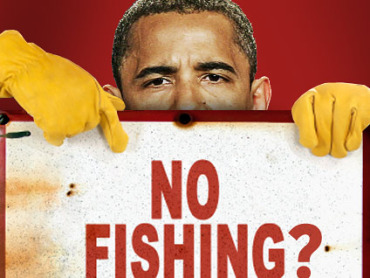 I am writing regarding the proposal to expand the Papahanaumokuakea Marine National Monument and to ban commercial fishing there. I work in Hawaii’s fishing industry, but besides it being my livelihood it’s my love and passion. Fish isn’t just a source of food to me or the people of Hawaii; it’s a huge part of the culture. Hawaii’s fishing industry and economy will be impacted if this monument is expanded. I am strongly opposed to the expansion of this monument. We are already limited on locally sourced foods and this would take a significant amount of fresh fish away from Hawaii. Read the rest here 14:04
I am writing regarding the proposal to expand the Papahanaumokuakea Marine National Monument and to ban commercial fishing there. I work in Hawaii’s fishing industry, but besides it being my livelihood it’s my love and passion. Fish isn’t just a source of food to me or the people of Hawaii; it’s a huge part of the culture. Hawaii’s fishing industry and economy will be impacted if this monument is expanded. I am strongly opposed to the expansion of this monument. We are already limited on locally sourced foods and this would take a significant amount of fresh fish away from Hawaii. Read the rest here 14:04
California’s offshore seamounts at risk of being closed
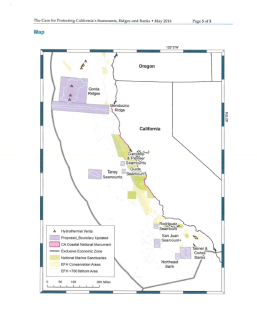 It has long been rumored that conservation groups were hoping to have the President use the Antiquities Act to designate Tanner and Cortes banks as National Marine Monuments. Finally, this rumor has been put on paper and its reach is far more than just the two areas mentioned above. The areas in grey below are those being proposed for Monument designation. Unlike the substantial public process that accompanies creation of a National Marine Sanctuary, designation of an area as a National Marine Monument is done outside the public eye – under the Antiquities Act. The Antiquities Act (54 USC §320301 et seq) empowers the President to, “in the President’s discretion, declare by public proclamation historic landmarks, historic and prehistoric structures, and other objects of historic or scientific interest that are situated on land owned or controlled by the Federal Government to be national monuments.” Read the rest here 17:09
It has long been rumored that conservation groups were hoping to have the President use the Antiquities Act to designate Tanner and Cortes banks as National Marine Monuments. Finally, this rumor has been put on paper and its reach is far more than just the two areas mentioned above. The areas in grey below are those being proposed for Monument designation. Unlike the substantial public process that accompanies creation of a National Marine Sanctuary, designation of an area as a National Marine Monument is done outside the public eye – under the Antiquities Act. The Antiquities Act (54 USC §320301 et seq) empowers the President to, “in the President’s discretion, declare by public proclamation historic landmarks, historic and prehistoric structures, and other objects of historic or scientific interest that are situated on land owned or controlled by the Federal Government to be national monuments.” Read the rest here 17:09
Mid Atlantic: National Ocean Policy threatens new regulatory burdens
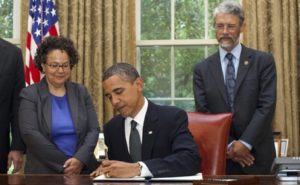 Since its creation by Executive Order in 2010, the Obama administration has hailed its National Ocean Policy (NOP) as a non-regulatory, stakeholder-driven initiative that will lead to reduced burdens and less uncertainty for ocean user groups. In reality, it’s nothing of the sort. This was highlighted recently during a hearing held by the U.S. House Natural Resources’ Water, Power and Oceans Subcommittee on the implications of the NOP, where House Natural Resources Committee Chairman Rob Bishop summed up many of the concerns of stakeholders when he noted that “it’s creating more uncertainty, and it certainly is not helping the industry and it’s not helping the environment.” You know what? He’s right. The Long Island Commercial Fishing Association (LICFA) has been closely monitoring the development and implementation of the NOP since its establishment six years ago. We’ve had no other choice, as we represent stakeholders in New York’s $1.4 billion boat-to-table seafood industry, with Long Island in particular landing 99 percent of the state’s wild-caught seafood. Read the rest here 16:42
Since its creation by Executive Order in 2010, the Obama administration has hailed its National Ocean Policy (NOP) as a non-regulatory, stakeholder-driven initiative that will lead to reduced burdens and less uncertainty for ocean user groups. In reality, it’s nothing of the sort. This was highlighted recently during a hearing held by the U.S. House Natural Resources’ Water, Power and Oceans Subcommittee on the implications of the NOP, where House Natural Resources Committee Chairman Rob Bishop summed up many of the concerns of stakeholders when he noted that “it’s creating more uncertainty, and it certainly is not helping the industry and it’s not helping the environment.” You know what? He’s right. The Long Island Commercial Fishing Association (LICFA) has been closely monitoring the development and implementation of the NOP since its establishment six years ago. We’ve had no other choice, as we represent stakeholders in New York’s $1.4 billion boat-to-table seafood industry, with Long Island in particular landing 99 percent of the state’s wild-caught seafood. Read the rest here 16:42
Regardless of legally caught sharks, California’s ban on possession and sale of shark fins stands
 California’s ban on the possession and sale of shark fins survived a legal challenge Monday when the U.S. Supreme Court rejected an appeal by Bay Area suppliers and sellers of shark fin soup, a traditional dish in the Chinese American community. “The purpose of the (California) shark fin law is to conserve state resources, prevent animal cruelty, and protect wildlife and public health,” the Ninth U.S. Circuit Court of Appeals in San Francisco said in a 2-1 ruling. The court said opponents of the state law had acknowledged that it still allows the use of about 95 percent of any legally caught shark for meat, skin and oils. The Obama administration at first supported opponents of the state law, filing arguments in 2013 that disputed California’s authority to restrict the sale of sharks that had been legally caught in federal waters. But it later changed its position after discussions with state fish and wildlife officials and said the two laws could be harmonized, with federal rules governing shark fishing while California regulated commerce within the state. Read the rest here 12:29
California’s ban on the possession and sale of shark fins survived a legal challenge Monday when the U.S. Supreme Court rejected an appeal by Bay Area suppliers and sellers of shark fin soup, a traditional dish in the Chinese American community. “The purpose of the (California) shark fin law is to conserve state resources, prevent animal cruelty, and protect wildlife and public health,” the Ninth U.S. Circuit Court of Appeals in San Francisco said in a 2-1 ruling. The court said opponents of the state law had acknowledged that it still allows the use of about 95 percent of any legally caught shark for meat, skin and oils. The Obama administration at first supported opponents of the state law, filing arguments in 2013 that disputed California’s authority to restrict the sale of sharks that had been legally caught in federal waters. But it later changed its position after discussions with state fish and wildlife officials and said the two laws could be harmonized, with federal rules governing shark fishing while California regulated commerce within the state. Read the rest here 12:29
Enviro’s spar with Obama administration over fish catches!
 A proposed federal rule that would give regional councils more say in setting catch limits on fish has sparked rare friction between the Obama administration and environmental groups. The proposal, years in the making, could take effect this summer. It would provide the eight councils “additional clarity and potential flexibility” to comply with the Magnuson-Stevens Fisheries Conservation and Management Act. Groups like the Natural Resources Defense Council and Earth Justice say the change could roll back nearly a decade of progress in rescuing once-overfished populations. Read the rest here 20:58
A proposed federal rule that would give regional councils more say in setting catch limits on fish has sparked rare friction between the Obama administration and environmental groups. The proposal, years in the making, could take effect this summer. It would provide the eight councils “additional clarity and potential flexibility” to comply with the Magnuson-Stevens Fisheries Conservation and Management Act. Groups like the Natural Resources Defense Council and Earth Justice say the change could roll back nearly a decade of progress in rescuing once-overfished populations. Read the rest here 20:58
Editorial: ‘Monument’ plan dries up
 It turns out there are limits to how far even the Obama administration will go to please the green lobby. The White House has opted not to designate an area of the Atlantic off Cape Ann as a national monument, which would have closed it to commercial fishing and activities such as oil or gas exploration or extraction — permanently. Gov. Charlie Baker last fall had written to President Obama of his objections to the pending national monument designation for Cashes Ledge and a second area known as the New England Canyons and Seamounts, largely because of the unilateral nature of the decision. Some members of the state’s congressional delegation had also raised concerns. Read the rest, Click here 09:14
It turns out there are limits to how far even the Obama administration will go to please the green lobby. The White House has opted not to designate an area of the Atlantic off Cape Ann as a national monument, which would have closed it to commercial fishing and activities such as oil or gas exploration or extraction — permanently. Gov. Charlie Baker last fall had written to President Obama of his objections to the pending national monument designation for Cashes Ledge and a second area known as the New England Canyons and Seamounts, largely because of the unilateral nature of the decision. Some members of the state’s congressional delegation had also raised concerns. Read the rest, Click here 09:14


































